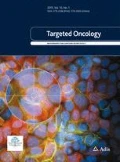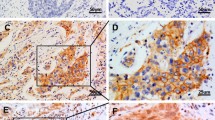Abstract
Metastatic tumor antigen 2 (MTA2) is a member of the MTA family that is closely associated with tumor progression and metastasis. In this study, the expression profile of MTA2 in 223 cases of non-small cell lung cancer (NSCLC) tissues and two lung cancer cell lines was investigated. Interestingly, we found MTA2, which was believed to have nuclear distribution only, was distributed in both nucleus and cytoplasm in normal and cancer cells. Nuclear MTA2 expression was detected in 148 cases of NSCLC (66.4 %), and was correlated with advanced TNM stages (p = 0.023), tumor size (p = 0.036), and lymph node metastasis (p = 0.004). Besides, the Ki-67 proliferation index was significantly higher in nuclear MTA2-positive tumors than in nuclear MTA2-negative tumors (r = 0.538, p = 0.006). However, there was no significant difference in cytoplasmic MTA2 status by age, gender, tumor stage, histology, grade, lymph node metastasis, and Ki-67 proliferation index. Univariate analysis revealed nuclear MTA2 expression was correlated with poor overall survival (p = 0.035), whereas there was a nonsignificant trend in the same direction for cytoplasmic MTA2 (p = 0.134). Multivariate Cox regression analysis revealed the overexpression of nuclear and cytoplasmic MTA2 not to be independent factors predictive of poor disease outcome. Our data suggested that MTA2 might play roles in both the nucleus and cytoplasm in the progression of NSCLC.






Similar content being viewed by others
Reference
Ganti AK, Huang CH, Klein MA, Keefe S, Kelley MJ (2011) Lung cancer management in 2010. Oncology (Williston Park, NY) 25:64–73
Liotta LA, Steeg PS, Stetler-Stevenson WG (1991) Cancer metastasis and angiogenesis: an imbalance of positive and negative regulation. Cell 64:327–336
Sleeman J, Steeg PS (2010) Cancer metastasis as a therapeutic target. Eur J Cancer 46:1177–1180
Yaguchi M, Wada Y, Toh Y, Iguchi H, Kono A, Matsusue K et al (2005) Identification and characterization of the variants of metastasis-associated protein 1 generated following alternative splicing. Biochim Biophys Acta 1732:8–14
Bowen NJ, Fujita N, Kajita M, Wade PA (2004) Mi-2/NuRD: multiple complexes for many purposes. Biochim Biophys Acta 1677:52–57
Kumar R, Wang RA, Bagheri-Yarmand R (2003) Emerging roles of MTA family members in human cancers. Semin Oncol 30:30–37
Toh Y, Kuninaka S, Endo K, Oshiro T, Ikeda Y, Nakashima H et al (2000) Molecular analysis of a candidate metastasis-associated gene, MTA1: possible interaction with histone deacetylase 1. J Exp Clin Cancer Res 19:105–111
Moon WS, Chang K, Tarnawski AS (2004) Overexpression of metastatic tumor antigen 1 in hepatocellular carcinoma: relationship to vascular invasion and estrogen receptor-alpha. Hum Pathol 35:424–429
Hamatsu T, Rikimaru T, Yamashita Y, Aishima S, Tanaka S, Shirabe K et al (2003) The role of MTA1 gene expression in human hepatocellular carcinoma. Oncol Rep 10:599–604
Sasaki H, Moriyama S, Nakashima Y, Kobayashi Y, Yukiue H, Kaji M et al (2002) Expression of the MTA1 mRNA in advanced lung cancer. Lung Cancer 35:149–154
Toh Y, Kuwano H, Mori M, Nicolson GL, Sugimachi K (1999) Overexpression of metastasis-associated MTA1 mRNA in invasive oesophageal carcinomas. Br J Cancer 79:1723–1726
Hofer MD, Kuefer R, Varambally S, Li H, Ma J, Shapiro GI et al (2004) The role of metastasis-associated protein 1 in prostate cancer progression. Cancer Res 64:825–829
Iguchi H, Imura G, Toh Y, Ogata Y (2000) Expression of MTA1, a metastasis-associated gene with histone deacetylase activity in pancreatic cancer. Int J Oncol 16:1211–1214
Jang KS, Paik SS, Chung H, Oh YH, Kong G (2006) MTA1 overexpression correlates significantly with tumor grade and angiogenesis in human breast cancers. Cancer Sci 97:374–379
Wang S, Qi Y, Zhang J, Zhang Q, Li H, Qiu X (2010) Expression and significance of MTA2 in non-small cell lung cancer. Zhongguo fei ai za zhi Chinese J Lung Cancer 13:777–780
Goldstraw P, Crowley J, Chansky K, Giroux DJ, Groome PA, Rami-Porta R et al (2007) The IASLC Lung Cancer Staging Project: proposals for the revision of the TNM stage groupings in the forthcoming (seventh) edition of the TNM Classification of malignant tumours. J Thorac Oncol 2:706–714
Travis WD, Brambilla E, Muller-Hermelink HK, Harris CC (2004) World health organization classification of tumours: pathology and genetics of tumours of the lung, pleura, thymus and heart. IARC Press, Lyon
Dai SD, Wang Y, Jiang GY, Zhang PX, Dong XJ, Wei Q et al (2010) Kaiso is expressed in lung cancer: its expression and localization is affected by p120ctn. Lung Cancer 67:205–215
Dai SD, Wang Y, Miao Y, Zhao Y, Zhang Y, Jiang GY et al (2009) Cytoplasmic Kaiso is associated with poor prognosis in non-small cell lung cancer. BMC Cancer 9:178
Cui Y, Niu A, Pestell R, Kumar R, Curran EM, Liu Y et al (2006) Metastasis-associated protein 2 is a repressor of estrogen receptor alpha whose overexpression leads to estrogen-independent growth of human breast cancer cells. Molecular Endocrinol 20:2020–2035
Manavathi B, Singh K, Kumar R (2007) MTA family of coregulators in nuclear receptor biology and pathology. Nucl Recept Signal 5:e010
Luo J, Su F, Chen D, Shiloh A, Gu W (2000) Deacetylation of p53 modulates its effect on cell growth and apoptosis. Nature 408:377–381
Chakraborty S, Ganti AK, Marr A, Batra SK (2010) Lung cancer in women: role of estrogens. Expert Rev Respir Med 4:509–518
Zhang Y, Ng HH, Erdjument-Bromage H, Tempst P, Bird A, Reinberg D (1999) Analysis of the NuRD subunits reveals a histone deacetylase core complex and a connection with DNA methylation. Genes Dev 13:1924–1935
Xia L, Zhang Y (2001) Sp1 and ETS family transcription factors regulate the mouse Mta2 gene expression. Gene 268:77–85
Acknowledgments
This study was supported by the National Natural Science Foundation of China (grants 81071717 to S-D Dai, 81071905 to E-H Wang, 81000995 to Y Han and 81000942 to Y Miao) and Doctoral Foundation of Ministry of Education of China (no. 20102104120027 to S-D Dai)
Conflicts of interest
None
Author information
Authors and Affiliations
Corresponding author
Rights and permissions
About this article
Cite this article
Liu, SL., Han, Y., Zhang, Y. et al. Expression of metastasis-associated protein 2 (MTA2) might predict proliferation in non-small cell lung cancer. Targ Oncol 7, 135–143 (2012). https://doi.org/10.1007/s11523-012-0215-z
Received:
Accepted:
Published:
Issue Date:
DOI: https://doi.org/10.1007/s11523-012-0215-z




